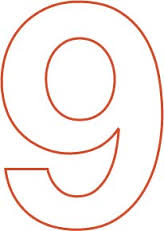记忆方法
将“nine”与“nein”结合记忆,后者是德语中的“九”,发音相似。想象数字9形状,如同一个“N”翻过来,与之关联德语单词“nein”,帮助记忆数字9。
以上内容由AI生成, 仅供参考和借鉴
中文词源
nine 九
来自古英语nigen,来自PIE*newn,九,词源同noon,November.一种观点认为该词与PIE*newos属于同一词源,新的,词源同new,novelty.因为九在古代观念里意味着完美,顶点,同时也意味着新生,新的开始。
英语词源
- nine
-
nine: [OE] Nine is part of a general Indo- European family of ‘9’-words, which trace their ancestry back to a prehistoric *newn or *enewn. Among the descendants of these are Greek ennéa, Latin novem (source of English November), Irish nóin, Lithuanian devynì, and Russian devyat’. Its Germanic forms *niwun or *nigun have differentiated into German neun, Dutch negen, Swedish nio, Danish ni, and English nine. Noon is so called from being originally the ‘ninth’ hour.
=> noon - nine (n.)
- Old English nigen, from Proto-Germanic *niwun (cognates: Old Saxon nigun, Old Frisian niugun, Old Norse niu, Swedish nio, Middle Dutch neghen, Dutch negen, Old High German niun, German neun, Gothic niun "nine"), from PIE newn "nine" (cognates: Sanskrit nava, Avestan nava, Greek ennea, Albanian nende, Latin novem (with change of -n- to -m- by analogy of septem, decem), Lithuanian devnyi, Old Church Slavonic deveti (the Balto-Slavic forms by dissimilation of -n- to -d-), Old Irish noin, Welsh naw).
Nine to five "the average workday" is attested from 1935. Nine days has been proverbial since 14c. for the time which a wonder or novelty holds attention.
权威例句
- 1. Seventy-nine voted in the affirmative, and none in the negative.
- 79人投赞成票,没有人投反对票。
- 2. The price of a single ticket is thirty-nine pounds.
- 单程票的价格是39英镑。
- 3. Some supernova researchers wondered if it might be just a nine-day wonder.
- 有些超新星研究者怀疑,这可能只是昙花一现。
- 4. I looked down the hallway to room number nine.
- 我顺着走廊看了一眼9号房。
- 5. His nine-month sentence was overturned by Appeal Court judge Lord Justice Watkins.
- 上诉法院法官沃特金斯撤销了对他作出的9个月徒刑的判决。

